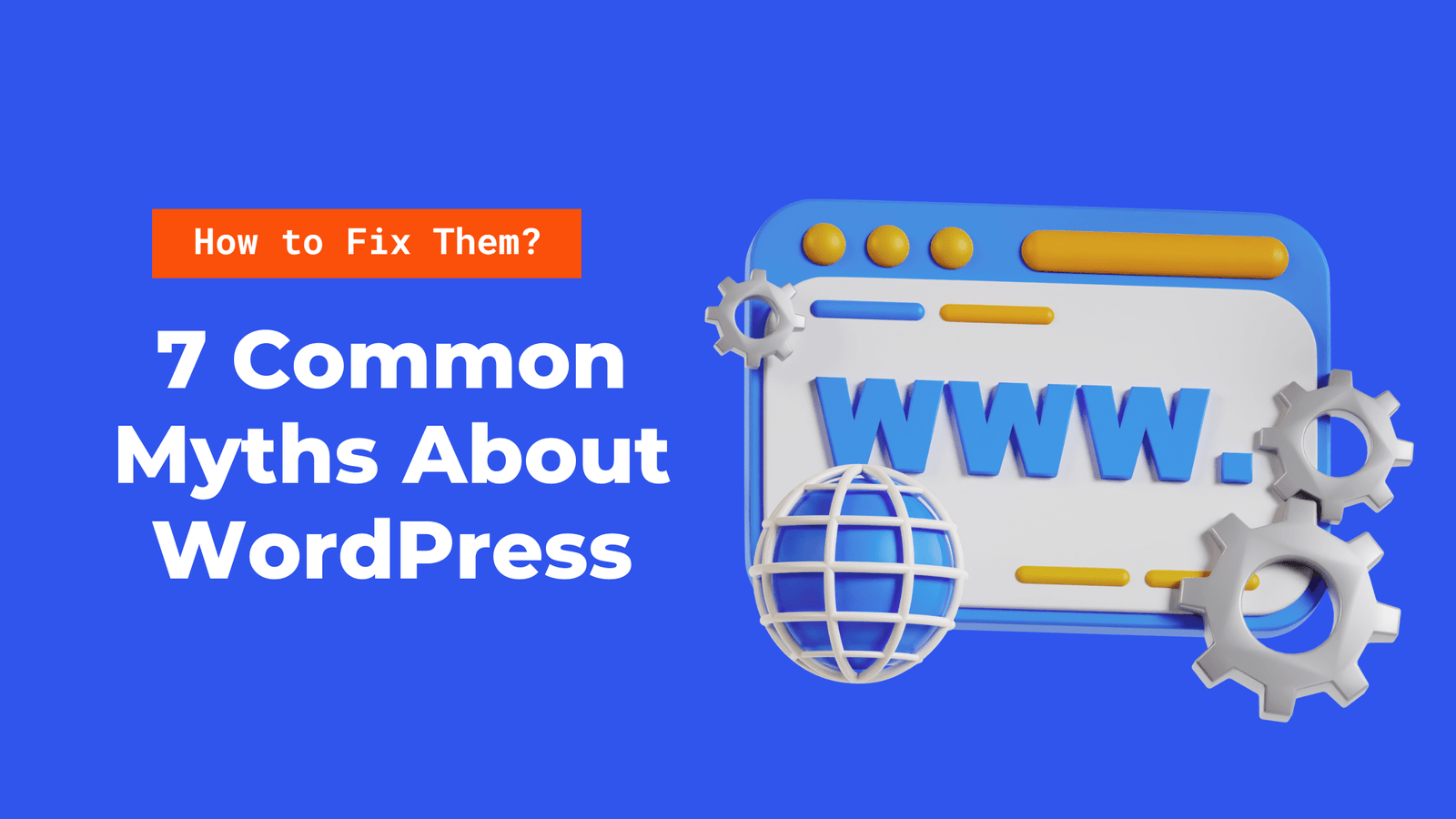Being the most popular content management system globally—with over 40% of sites on the internet using WordPress—is no small feat. Yet, many myths are still being propagated about the WordPress platform, despite its abundant popularity and heavy usage across the globe. Most of the time, such myths mislead users or contribute to missed opportunities for people who would have chosen the platform for their work. Let’s take a look at what some of these common myths about WordPress are and how to put the record straight.
Myth 1: WordPress Is Meant Only for Blogging
One of the most enduring myths is that WordPress is only good for blogging. But it’s true that WordPress started off as little more than a blogging platform; it has since outgrown those limitations. Now, WordPress is a multifarious CMS for designing almost any type of website: e-commerce shops, portfolios, business websites, forums, social networks, and much, much more. There exist literally thousands of themes and plugins to adapt WordPress to just about any need.
Correction: WordPress is a fully-featured content management system that is capable of handling all sorts of website types. Whether you are in need of a simple blog or a complex eCommerce site, WordPress has the dexterity to lean back and fall to your demand.
Myth 2: WordPress Is Not Secure
The next misconception about WordPress relates to securing it or getting it secure. I assume this is because WordPress is referred to as open-source software, meaning anyone can get to the code. This way, while this may render WordPress an easy target for hackers, it doesn’t mean it is an insecure platform. The fact of the matter is that WordPress is as secure as you make it. Most security issues arise from outdated plugins, themes, or WordPress versions, as well as weak passwords.
Correction: WordPress is secure if you follow best practices. Keep updating your themes, plugins, and WordPress itself, use sturdy passwords, and consider two-factor authentication, strong security plugins, and others.
Myth 3: WordPress Is Too Complicated for Beginners
Some people feel that WordPress is relatively complicated for beginners, especially if they are not technicians. This is mainly a myth based on the fact that WordPress still gives the user so much room for customization and flexibility while using the platform. It is easy, and one can install WordPress easily since most hosting services have a one-click installation for WordPress. There are literally thousands of tutorials, support forums, and communities where even beginners can seek help to start working on WordPress.
Correction: WordPress is easy for beginners, and with a little time spent playing around, anyone can use it effectively. Start with a simple theme and gradually explore the more advanced features as you become comfortable with the platform.
Myth 4: All WordPress Sites Look Similar
Another myth is that all WordPress websites look the same, something that makes people imagine design limitations when using WordPress. Well, it is not true. WordPress offers an incredible number of themes and design tools, including a huge number of page builders, such as Elementor, which means an incredible array of design possibilities can be realized. WordPress can offer you an original design for your personal brand, from a simple blog to an online shop with a lot of commotion.
Re-imagine: Your WordPress site can be as unique and diverse as your imagination with thousands of themes, plugins, and customizable options enabling you to develop a site that is one of a kind and entirely your own.
Myth 5: WordPress is just for small websites
Some feel WordPress is only meant for small-scale websites and, when one expects huge traffic, it will not perform on large-scale websites. Nothing could be further from the truth. WordPress can be scaled and optimized in order to serve a website of any size—from small blogs to enterprise-level, high-traffic sites with more than a million users. In fact, The New Yorker, BBC America, and TechCrunch are just some of the big businesses and high-traffic websites using WordPress.
Correction: WordPress indeed is very scalable, and it can support websites of almost any size. With effective hosting, caching, and optimization strategies, WordPress gracefully manages enormous quantities of traffic and complex functionalities.
Myth 6: WordPress Is Free, So It Must Be Junky
Because the nature is that WordPress is free, some people will think it’s not good quality or lacks features. However, that’s right because WordPress is free. Not bad; in fact, it is the most powerful and flexible CMS platform available.
Correction: WordPress being free is a reflection of its open-source nature, not its quality. It’s a robust platform used by millions of websites, from personal blogs to major corporate sites. While the core software is free, you may need to invest in premium themes, plugins, or hosting to unlock its full potential.
Myth 7: WordPress Is Not Suitable for E-commerce
Some state that WordPress stops functioning in the case of e-commerce websites, and it’s specialized platforms like Shopify, which helps in the development of online stores. But the case is quite the opposite with the WooCommerce plugin; WordPress, in reality, supports the development of fully customizable e-commerce websites wherein everything from a product catalog to shopping carts and even payment gateways is integrated.
Correction: WordPress is great for e-commerce with the best combination and compatibility of WooCommerce; flexible, customizable, and extremely scalable to use for small online shops and huge e-commerce enterprises
Final Thought
Misconceptions about WordPress usually have their roots in outdated information or not knowing everything a platform like WordPress is capable of. The more you know about what WordPress can really offer, the better placed you are to make informed decisions on whether or not WordPress is the right fit for your website needs. WordPress is a powerful and flexible CMS, which provides security and is able to almost practically fit any kind of website, hence very useful to both businesses and individuals.



